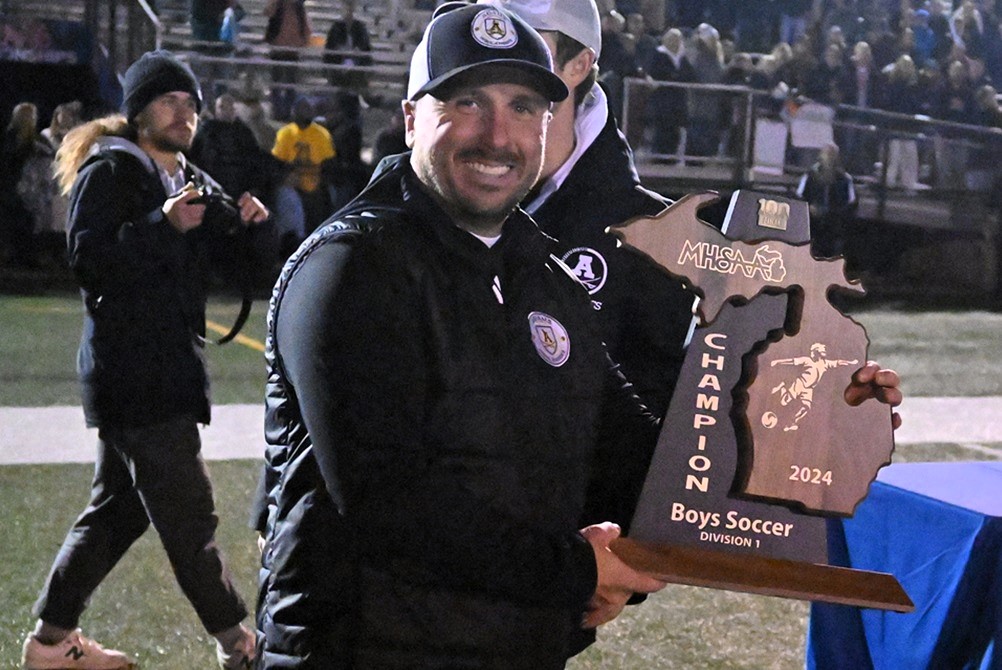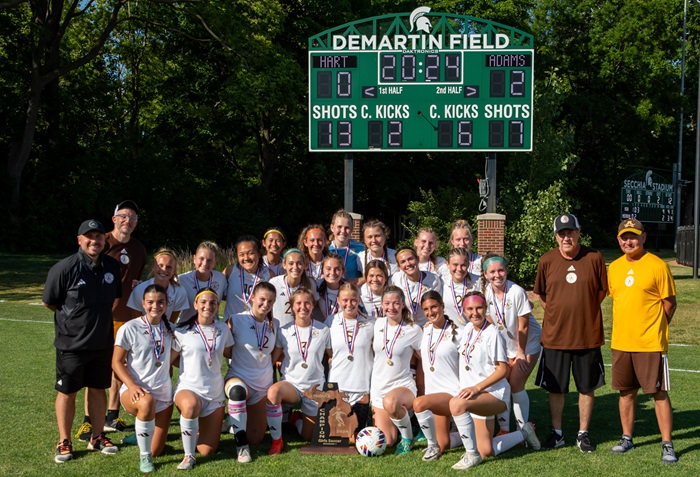
AD Inducted to National Hall of Fame
May 7, 2014
By Geoff Kimmerly
Second Half editor
Winter gets hectic so quickly that we’re forced to save some intriguing items that come our way for a sunnier day – and that day is today.
Following are news, notes and a few key links collected over the last few months, including the national Hall of Fame induction of a longtime Michigan athletic director, local recognition for another and statewide acclaim for a group of students putting their video production equipment to good use benefiting all.
Ann Arbor AD Honored Nationally
Former Ann Arbor Huron athletic director Jane Bennett was among five inducted into the National Interscholastic Athletic Administrators Association Hall of Fame in December.
Bennett served 26 years as a teacher, coach, athletic director and assistant principal in Michigan before spending the last decade as a principal at two schools in Montana. She served as athletic director at Huron for 15 years through 2002-03. The NIAAA reported that during her final decade in that position, participation in athletics doubled.
Bennett, who received her bachelor’s and master’s degrees from the University of Michigan, began her career at Huron in 1977 as varsity softball coach and became a math teacher and the co-director of athletics a year later. She coached the softball team 14 seasons before moving into the full-time athletic director position. Bennett was co-founder of the Michigan High School Softball Coaches Association and served as MHSSCA president from 1982-87.
Among other achievements at Huron, Bennett was a leader in a successful campaign to gain voter approval of a $60 million bond package, which included $20 million to improve and expand athletic facilities. She also developed curriculum for an annual varsity captains/head coaches leadership training program and composed handbooks/guidebooks for coaches, athletes and parents.
Bennett also was a valuable contributor to the Michigan Interscholastic Athletic Administrators Association and the NIAAA. She was president of the MIAAA in 1993-94 and a state conference speaker on several occasions. Bennett also served in various NIAAA leadership positions including on the committee that developed the Leadership Training Institute in 1996.
Bennett was named MIAAA Athletic Director of the Year in 1998 and received its State Award of Merit in 1997. She received the MHSAA’s Women in Sports Leadership Award in 1995 and was inducted into the MHSSCA Hall of Fame in 1995. Prior to her selection to the NIAAA Hall of Fame, Bennett was honored with the NIAAA Distinguished Service Award in 1998 and the NIAAA Thomas E. Frederick Award of Excellence in 2000. In 2005, she was inducted into the National Council of Secondary School Athletic Directors Hall of Fame, having served as its president in 2003 and been selected as its Athletic Director of the Year in 1998.
PSL's Ward: 'Pillar' of Detroit Athletics
Alvin Ward, the executive director of athletics for the Detroit Public School League and a member of the MHSAA Representative Council, received a 2014 Pillar in the Community Award in April from the Coast II Coast All-Stars, a Detroit-based pro basketball team that plays in the American Basketball Association.
Ward has served as a teacher, assistant principal and principal as well for Detroit Public Schools, and directs programs with a combined 500 coaches and 4,500 athletes.
Linked up
- This winter, the MHSAA Representative Council adopted a number of football practice rules changes aimed at improving player acclimatization at the start of fall and reducing head trauma and injuries. The Adrian Daily Telegram’s Doug Donnelly got responses from a number of coaches from that area of the state; click to find out why they feel these changes are important.
- Port Huron Times Herald writer Paul Costanzo let people know about our Student Advisory Council through the experience of Marlette’s Connor Thomas, one of our juniors and a great contributor this school year.
Power of Awareness
The Kimberly Anne Gillary Foundation works to educate Michigan schools on sudden cardiac arrest and train personnel in CPR and the use of an AED (automated external defibrillator). The video below teaches us again about the importance of awareness.
Saginaw Heritage was awarded $5,000 in April as the winner of the Gillary Foundation’s High School AED Contest. Students were asked to create a 3-minute video emphasizing the importance of Michigan high schools being adequately prepared to respond to a sudden cardiac arrest or related event on school property.
Randy and Sue Gillary created the foundation after their 15-year-old daughter Kimberly – an athlete at Troy Athens – died after suffering sudden cardiac arrest in 2000. The contest judges were Kimberly’s sisters Emily Kucinich, Jennifer Gregroy and Katie Gillary.
As of April 1, the Gillary Foundation had raised $1.2 million and donated 650 AEDs to schools – with three lives having been saved with donated AEDs. For more, click www.kimberlysgift.org.

Hickey Joins Notable Coaching Crew as Adams Completes 2024 Soccer Sweep
By
Keith Dunlap
Special for MHSAA.com
November 14, 2024
When New Year’s Eve comes this year and the ball drops to welcome in 2025, Rochester Adams boys and girls soccer coach Josh Hickey might be hesitant to celebrate this year coming to an end.
 It’s not that he won’t be excited for the new year. It’s just that it might be impossible to top 2024 from a coaching perspective.
It’s not that he won’t be excited for the new year. It’s just that it might be impossible to top 2024 from a coaching perspective.
In June, Hickey made history when he helped guide the Adams girls to the Division 1 championship with a 2-0 win over Hartland.
He joined the list of soccer coaches in state history who have led both boys and girls programs to Finals championships, a group that includes Barry Brodsky of Bloomfield Hills Marian/Brother Rice, Randy Heethuis of Hudsonville Unity Christian, Brian Guggemos of Okemos, Ken Johnson of Salem, Brian O’Leary of Novi, Tim Storch of Troy Athens and Clark Udell of Grand Rapids Forest Hills Central.
“That’s good company to keep, that’s for sure,” Hickey said in praising those other coaches who have pulled off the feat.
Earlier this month, the Adams boys followed in the footsteps of their classmates from this spring, defeating Byron Center in the Division 1 Final, 2-0, to win the program’s second Division 1 title over the last three years. Adams downed Rockford in the 2022 Final, also by a 2-0 score.
Adams also won girls and boys Division 1 soccer titles during the same calendar year in 1999, but with those teams led by separate coaches.
Hickey said while each team had talent and players all came from great soccer backgrounds and families, the two championship runs were quite different.
“With the girls, I would imagine nobody picked us necessarily to go that far, especially at the beginning of the season,” he said. “Throughout the year, the girls were just super resilient. The expectation wasn’t there.”
It was a far different element once the fall started and the boys took the field, given there was a solid core of returnees and also five MLS Next academy players who decided to experience high school soccer for their senior year, including eventual Mr. Soccer Award winner Alex Rosin.
 “With the boys, we had to battle through all those expectations,” Hickey said. “There is something with your mental toughness to see if the kids can even handle that pressure. They handled it better than I thought they would. It was never a concern or issue.
“With the boys, we had to battle through all those expectations,” Hickey said. “There is something with your mental toughness to see if the kids can even handle that pressure. They handled it better than I thought they would. It was never a concern or issue.
“The girls came in and just wanted a good year and then ended up having the most success they could ever imagine. The boys came in telling me they wanted to win the whole thing from day one.”
On Oct. 30 – when the Adams boys team defeated Saline in their Semifinal (2-1 in penalty kicks) – it just so happened to be the same day the girls team got its championship rings.
“Some of the girls came and showed us during lunch and throughout the day,” Rosin said. “It just gave us extra motivation. We had to win two more, and we successfully did. At the time, we wanted it so bad and we saw them wear the rings at school. It made us want it even more.”
For the record, Rosin said playing high school soccer — even if it was just for one year — was an experience he’ll never forget.
“Hickey played me at every position,” Rosin said. “It was a good experience to learn the game in a different way. Just kind of push myself and test myself every day. Different positions and trying to become the best player I can be.
“One thing I’ll take away is the memories and new bonds I made with my teammates. It was something incredible.”
Despite the boys season being over, Hickey said the transition to girls season will wait a bit. There is still the matter of the postseason banquet to attend to, as well as championship celebrations such as meeting the mayor of Rochester Hills and marching in the downtown Rochester Christmas parade.
But once the celebrations slow down and the holidays come to end, all attention will turn to the girls season and the run for a repeat next spring.
The Adams girls program has never won consecutive Finals titles, but should be well-equipped to give it a go.
“A lot of players come back from the starting group,” Hickey said. “We also had girls waiting in the wings waiting to play. We’re excited for it.”
While it will be difficult for Hickey and Adams soccer to say farewell to 2024, there clearly is a lot to look forward to for 2025 as well.
 Keith Dunlap has served in Detroit-area sports media for more than two decades, including as a sportswriter at the Oakland Press from 2001-16 primarily covering high school sports but also college and professional teams. His bylines also have appeared in USA Today, the Washington Post, the Detroit Free Press, the Houston Chronicle and the Boston Globe. He served as the administrator for the Oakland Activities Association’s website from 2017-2020. Contact him at [email protected] with story ideas for Oakland, Macomb and Wayne counties.
Keith Dunlap has served in Detroit-area sports media for more than two decades, including as a sportswriter at the Oakland Press from 2001-16 primarily covering high school sports but also college and professional teams. His bylines also have appeared in USA Today, the Washington Post, the Detroit Free Press, the Houston Chronicle and the Boston Globe. He served as the administrator for the Oakland Activities Association’s website from 2017-2020. Contact him at [email protected] with story ideas for Oakland, Macomb and Wayne counties.
PHOTOS (Top) Rochester Adams soccer coach Josh Hickey shows the Division 1 championship trophy after his boys team defeated Byron Center on Nov. 2 at Grand Ledge High School. (Middle) Hickey, far left, takes his spot in the team photo after Adams’ girls won the Division 1 title in June at Michigan State’s DeMartin Stadium.

